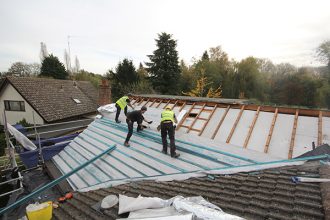WES+ GETS DIPLOMATIC PASS FROM US EMBASSY

Sir Robert McAlpine has specified Ramtech Electronics’ WES+ wireless fire alarm system for its temporary site accommodation units at the new American Embassy development in London.
WES+ was specified because it is a wireless system that complies with all the relevant sections of EN 54.
The 9th edition of The Joint Code of Practice (JCOP) reinforces the need for construction site fire alarm systems, including temporary accommodation units, to meet this important standard.
Version 9 of JCOP contains the advice: Components of automatic fire detection and alarm systems should be marked as complying with EN 54 (paragraph 13.8). JCOP is supported by the FPA (Fire Protection Association) and the insurance industry, and has made it much easier to specify construction site fire alarms by clarifying that the system should meet EN 54.
The site team at Sir Robert McAlpine took a lead from JCOP, with paragraph 13.8 stating that Temporary buildings or temporary accommodation located: inside the building under construction, inside another permanent building, or within 10m of such building(s), must be fitted with fire detection systems complying with a recognised Category of installation as set out in BS 5839-1: Fire detection and alarm systems for buildings.
This means that components of automatic fire detection and alarm systems used in temporary accommodation units on construction sites should be marked as complying with EN 54.
WES+, being the only wireless fire alarm system that has been independently tested and approved to comply with the relevant sections of EN54 was a major factor taken into account by Sir Robert McAlpine.
In specifying WES+ for the temporary accommodation units at the American Embassy development, Sir Robert McAlpine has demonstrated that it places the safety of its personnel, occupants of nearby buildings and its client’s assets above all else.
Pat Kelly, Works Manager at Sir Robert McAlpine, said: “We found the WES+ fire alarm system very easy to set up and the fact that it is wireless avoids the safety issue with trailing wires. We carried out a very careful evaluation of a number of fire alarm systems and so we are confident that WES+ offers us the best all round benefits and means we are EN 54 compliant.”
The WES+ fire alarm call points are fixed in the temporary accommodation units in accordance with a fire plan, creating a completely secure, wireless network. The alarm system can be manually triggered from any call point. 24/7 protection is provided by the WES+ smoke and heat detectors, which automatically activate the system in the event of a fire.
A WES+ monitored base station provides an alert if a fire is detected by any of the interconnecting radio units, incorporating the manual fire call points and automatic heat/smoke detection units. Ramtech Electronics’ WES+ base station can support an unlimited number of units. The WES+ system uses Category 1 receivers (ETSI 300-220-1) throughout, ensuring maximum signal reliability and does not interfere with nearby network signals.
WES+ is the UK’s leading EN 54 compliant wireless fire alarm system for construction and demolition projects, and is scalable for any size development. Once work is completed, being wireless means it can simply be transferred to the next site for re-use. Simplified on-site setup and three-year battery life means that it is possible to activate, add or clone units with just a few button presses.
Paul Henson, Sales and Marketing Director at Ramtech Electronics, said “With WES+ customers know that the complete unit – and every unit in the system, including base station, fire call point or smoke and heat detection unit – have been tested to the relevant part of EN54. If in doubt about your construction site fire alarm system, ask your supplier for the Declaration of Performance to verify what has been tested.”
Sir Robert McAlpine was awarded the £650m contract to rebuild the US Embassy in partnership with American firm B.L Harbert. The new embassy is in the Nine Elms area of Battersea and work began in 2013, with completion in 2017.
For more information about WES+, visit: www.wesfire.co.uk


